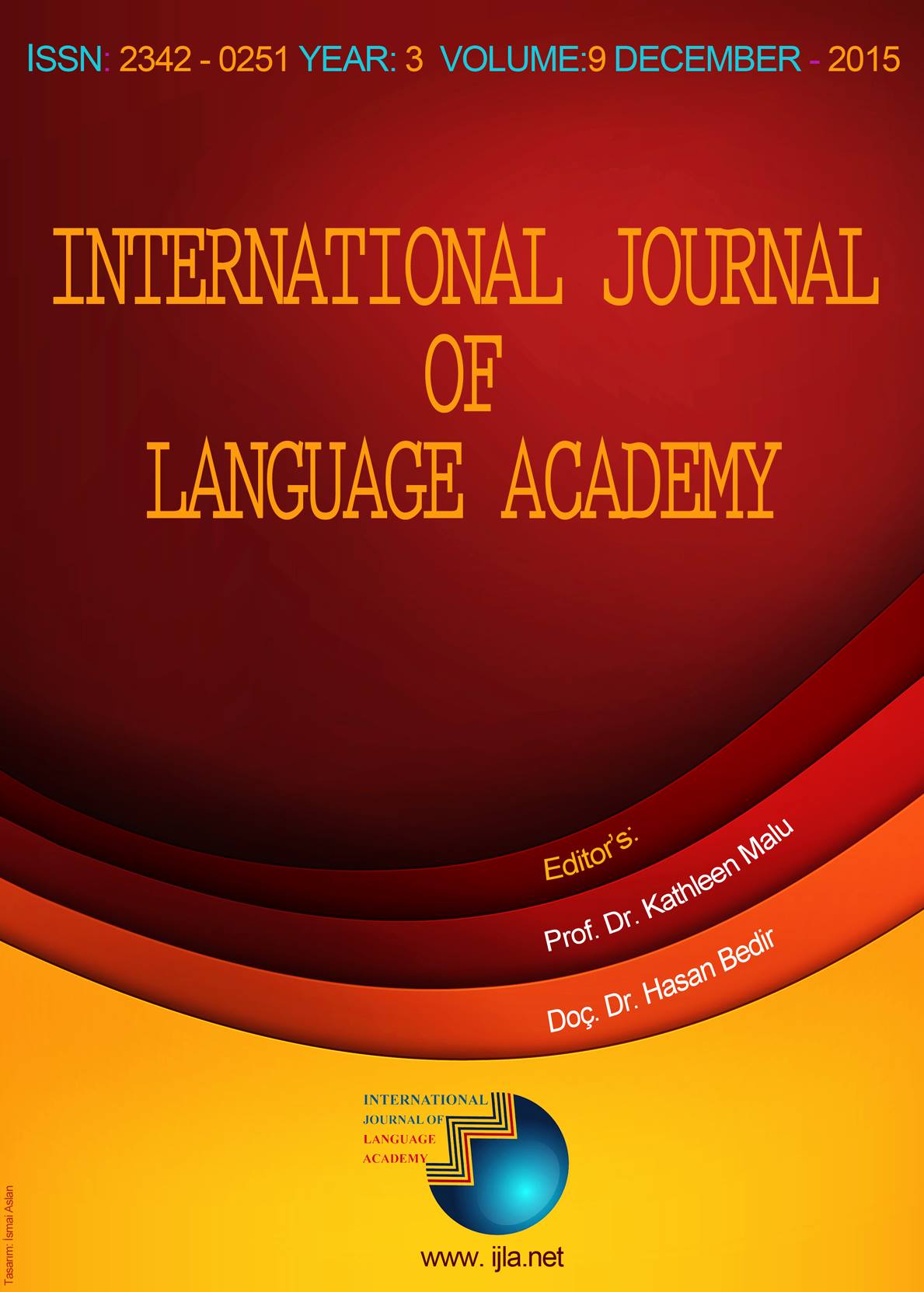TÜRKİYE’DE İLKÖĞRETİM SINIFLARI İNGİLİZCE DERSLERİNDEKİ PERFORMANS GÖREVLERİNE İLİŞKİN ÖĞRENCİ GÖRÜŞLERİ
Author :
Abstract
Bu çalışmanın amacı, İngilizce derslerindeki performans görevlerinin nitelik, uygulama, değerlendirme ve dil öğrenimine katkısı açısından İlköğretim Kurumları Yönetmeliği ile uyumunu araştırmak ve öğrencilerin bu uygulama ile ilgili görüşleri belirlemektir. Bu bağlamda, çalışmanın katılımcıları Adana’da 10 farklı devlet okulunda öğrenim gören 359 beşinci sınıf öğrencisiden oluşmaktadır. Çalışmanın verileri anket, görüşme ve doküman analizi sonucu elde edilmiştir. Sonuçlar, performans görevlerinin İlköğretim Kurumları Yönetmeliği amaçlarıyla kısmen uyumlu olduğunu fakat uygulamada birtakım sorunların olduğunu ortaya koymuştur. Çalışma sonuçları, performans görevlerinin, motivasyon artışı, kelime bilgisinde ve araştırma becerilerinde gelişme, dilbilgisinde gelişme ve sorumluluk bilinci kazandırma açısından yararlı olduğunu göstermiştir. Bu çalışmadan elde edilen bulgular ışığında Milli Eğitim Bakanlığına, öğretmen yetiştirme kurumlarına ve İngilizce öğretmenlerine önerilerde bulunulmuştur.
Keywords
Abstract
This study attempted to shed light into whether there was a match between the Primary Education Institutions’ Regulation and EFL classroom practice concerning performance tasks in terms of quality, process, evaluation, and potential contributions to language learning. In order to reach this aim, the opinions of 359 5th grade EFL students from 10 different schools in Turkey were consulted. In order to gain a deeper insight into the research questions, data were collected by means of questionnaires, interviews, and document analysis checklist. Results have shown that the intended goals of performance tasks in the schools which were included in this study were generally perceived to have been moderately achieved, alongside pointing to some learning gains as well as some problems in this framework. Performance Tasks have been found to be a useful practice as evidenced by the reported benefits such as increased motivation, vocabulary improvement, improvement of research, grammar reinforcement and raising consciousness and responsibilities. On the other hand, there have also been some problems experienced during this practice related to the characteristics, process, and evaluation of performance tasks. In the light of the findings from this study, some suggestions were made to language teachers, teacher training institutions, and the Ministry of National Education.
Keywords
- Allen, L.Q. (2004). Implementing a culture portfolio project within a constructivist paradigm. Foreign Language Annals, 37(2), 232-239.
- Bejarano, Y., & Gordon, C. (2009). Consideration for teaching and assessing young learners learning English as a foreign language. Retrieved December 28, 2009 from http://www.ericdigests.org/1997-4/young.htm.
- Cameron, L. (2001). Teaching languages to young learners. Cambridge: Cambridge University Press.
- Cohen, A. D. (1994). Assessing language ability in the classroom (2nd ed.). Boston, MA: Heinle and Heinle.
- Conner, O. (2008). Testing as a catalyst for progress and development. The Internation TEYL Journal. Retrieved January 16, 2008 from http://www.teyl.org/article7.html.
- Halliwell, S. (1992). Teaching English in the primary classroom. New York: Longman.
- Hasselgreen, A. (2005). Assessing the language of young learners. Sage Journals. Retrieved 15 May, 2010 from http://ltj.sagepub.com/content/22/3/337.full.pdf+html
- Hibbard, K. M., Wagenen, L., Lewbebel, S., Waterbury-Wyatt, S., Shaw, S., Pelletier, K. (1996). A teacher's guide to performance-based learning and assessment. Alexandria, VA: Association for Supervision and Curriculum Development.
- Katz, L. G. (1997). A developmental approach to assessment of young children. Retrieved May 12, 2010 from http://www.ericdigests.org/1997-4/young.htm.
- Kemaloglu, E. (2006). Project work: How well does ıt work? assessments of students and teachers about main course project work at Yıldız Technical University School of Foreign Languages Basic English Department. (Unpublished Master Thesis). Bilkent University, Ankara.
- Köksal, M.S., Koray, O., Ozsoy, T., Bagce, H., & Koray, A. (2006). Öğretim materyali geliştirmede portfolyo ve rubrik değerlendirmenin eleştirel ve yaratıcı düşünme üzerine etkisi. Muğla Üniversitesi XV. Ulusal Eğitim Bilimleri Kongresi Bildiri Özetleri, 170-171, Muğla: Nobel Yayınları.
- McKay, P. (2006). Assessing young learners. Cambridge: Cambridge University Press.
- Ministry of National Education Primary Institutions Regulation, No: 26156, 2006.
- Ministry of National Education Primary Institutions Regulation, No: 27090, 2008.
- Ministry of Education’s Circular, Project Design Seminars, 03.09.2007, No: 68/2006.
- Ministry of Education’s Circular, Testing and Evaluation in Primary Institutions, 19.12.2006, No: 95/2006.
- Ministry of Education’s Circular, Projects and Performance Tasks Done from the Internet, 25.01.2007, No: 1078/2007.
- Ministry of National Education’s Circular, Projects and Performance Tasks, 10.01.2008, No: 443/2008.
- Ministry of National Education’s Circular, Projects and Performance Tasks, 16.04.2009, No: 7273/2009.
- Pierce, L. V. & J. M. O’Malley. (1992). Performance and portfolio assessment for language minority students. Washington, DC: National Clearinghouse for Bilingual Education.
- Pinter, A. (2009). Teaching young language learners. Oxford: Oxford University Press.
- Rea-Dickins, P. (2000). Assessment in early years language learning contexts. Language Testing 17, 115–22.
- Rixon, S. (2010). Assessment of young learners of English. Retrieved May 12, 2010 from http://www.eltforum.com/forum/pdfs/assessment_ylearners.pdf.
- Shaaban, K. (2001). Assessment of young learners. English Teaching Forum, 39(4), 16-23.
- Shepard, L. A. (1994). The challenges of assessing young children appropriately. Retrieved May 12, 2010 from http://www.jstor.org/pss/20405297.
- Smith, K. (1996). Assessing and testing young learners: Can we? Should we? In Entry points: Papers from a symposium of the research, testing, and young learners special interest groups, ed. D. Allen. Kent, England: IATEFL.
- Taylor, L. (2006). Young learner testing. Retrieved May 12, 2010 from http://www.cambridgeesol.org/teach/yle/
- Tuncel, G., & Ozturk, C. (2006. Sosyal bilgiler dersinde rubriklerin etkili kullanımı, Muğla Üniversitesi XV. Ulusal Eğitim Bilimleri Kongresi Bildiri Özetleri, 304-305, Muğla: Nobel Yayınları.
- Vale, D., & Feunteun, A. (1995). Teaching children English. Cambridge: Cambridge
- Weigle, S. (2002). Assessing Writing. Cambridge: Cambridge University Press.
- Yanpar, T. (2005. Sosyal bilgiler dersinde oluşturmacı yaklaşımda öğrencilerin etkinlik dosyalarını yordayan değişkenler. Kastamonu Eğitim Dergisi, 13 (2), 513 526.
- Yildirim, R., & Orsdemir, E. (2013). Performance tasks as alternative assessment for young EFL learners: Does practice match the curriculum proposal? International Online Journal of Educational Sciences, 5(3), 562-574.
- Zimbicki, D. (2007). Examining the effects of alternative assessment on student motivation and self- efficacy. (Unpublished Doctoral Dissertation). Walden University.
